Welcome back! Last week we talked about brushing our teeth and tips on how to get a better dental check-up. If you missed this blog and would like to catch up, click HERE.
A Note From Our Executive Director, David Tate: For decades, I’ve assumed that my experience with my parents’ hoarding was unique; a shameful secret to hide. But hoarding is my parent’s illness; not a flaw in their character.
My story is about a system built to protect the rights of people who need help. Don’t expect the system to help you protect them from themselves. That’s what finally pushed me to bring the hoarding out of the shadows and find help and support from family, friends, and online. Don’t be ashamed to get help for yourself while you try and get help for the hoarder. ~David
When Parents Hoard
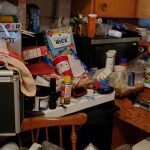
The topic this week is going to be a heavy one. I would like to talk about long-term hoarding and the elder hearts that stay in a relationship with inanimate objects, even if that relationship will lead them down the road to disaster.
Recently, I was exposed to a situation that seemed surreal. Elderly parents whose hoarding had escalated in their golden years to a level of hazard. The father, in particular, had a serious issue with hoarding. The mother was his enabler.
In this case, the elderly couple I’m about to tell you about is David’s parents. Several weeks ago, David received a call from his mother, stating she had fallen and couldn’t get up, and his dad wouldn’t allow her to call an ambulance. They were afraid that if the authorities saw the condition of their home, they would lose the ability to live independently. After learning his mom had been on the floor for an extended time, David called 911, and that is where our story begins.

This Is An Important Topic
For some reason, people feel like it’s taboo to talk about elderly hoarding. Oddly enough, it’s the secret-keeping that allows this type of situation to go unchecked, eventually leading to a crisis. Often adult children are not invited into the family home because the parents don’t want to discuss the situation, so things get really bad and nobody knows about it until it’s too late.
When the family does know about it and they’ve talked to their parents about getting help, they rarely agree to a plan. Parents can’t envision a life other than the one they are living, and they are scared to even try. And then the bad thing happens. The house catches on fire and the firefighters can’t get in to save the owners, or someone takes a bad fall and can’t get to the phone to call for help.
Can’t Somebody Help?
To make things more complicated, it doesn’t seem to matter if this type of behavior gets reported. Calling the crisis line gets you referral numbers to call on the next business day. Those numbers often include adult protective services, social workers in the county mental health department, police emergency and non-emergency numbers, and if one parent ends up in the hospital, a hospital social worker. There are also options to call the parents doctors, and psychiatrists if they have one, but due to HIPAA communication is somewhat limited.
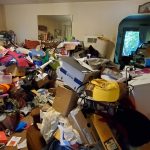
The shock comes when these calls go unheeded. Police reports get taken and filed, protective service workers attempt the first contact but are told to “go away“, social workers tell you that until something horrible happens they cannot step in, and doctors/psychiatrists tell you that your parents have a right to live any way they wish.
You can see the train wreck coming down the track, but are helpless to stop it. It’s a horrible feeling, and one many adult children will recognize. Your parents start to slide on the hygiene because they can’t access the shower or the washer and dryer. You notice they are eating out all the time because they can not use the kitchen. The signs are there…but the authorities cannot intervene.
I have personally worked in the field of mental health for more than 20 years. I fully understand and support the idea of self-determination. We are not talking about that. We are talking about a serious crisis in the making, with very few options other than to allow it to play itself out and hope that both parties are alive in the end. Hoarding can lead people down a very dangerous path, especially when it comes time to face the facts and a clean-up is imminent.
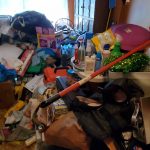
When The Bad Thing Finally Happens…
In our case, David’s mom fell in their home due to the clutter, and that led to her hospitalization. She struggled and struggled to get up, and in that struggle, her muscles started to break down and leach into her bloodstream. Her kidneys started to shut down, her heart started to fail, and she was in bad shape when her husband finally allowed her to call David, who then called an ambulance. It took the fire department an hour and a half to extricate her from their home. Protective Services were called, and they informed David’s dad that she would not be coming home to his care as it wasn’t safe. This caused him to threaten to kill his family, including his wife, and anyone at the hospital who tried to stop him from taking her home with him.
David’s father had a concealed weapons permit, with a cognitive testing score of 13. For reference, anything under 20 is considered dementia. This man had handguns, and long guns, and was a threat to use them. He was also going into rages and having blackouts, not remembering what he did or said during those hours.
Restraining orders were requested and denied because he was only talking and not following through. In my opinion, another hole in the system that easily could have had tragic consequences. He stated several times that he wouldn’t allow anyone to “touch” his stuff, and the threats would increase if he felt that someone may want to enter the home.
How Does This Happen?
David hadn’t been allowed in the house since college and had no idea the situation had escalated to this point but he knew it wasn’t good. He had preemptively talked to their doctors until he was blue in the face, being told time and again it was none of his business. His parents were “choosing to live this way“. End of story. Indeed. It was almost the end of his moms’ very life.
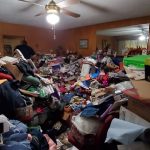
Hoarders.com explains that there are many reasons for demonstrating these behaviors. “In our countless hours of experience, we have found that hoarding is often found to affect brilliant people. We have assisted over 25,000 hoarders with 70% or more holding past or present careers such as engineers, professors, teachers, psychologists, and even rocket scientists. Simply put, hoarders syndrome is an ‘intelligent syndrome.’ This is important to mention because it makes the job for families that much harder. Due to the hoarder’s level of intelligence, they are able to hide the disorder, and commonly they are placed into positions where they manipulate family members and loved ones so that their hoarding issues are minimized“.
“Please realize that there is usually an underlying psychological disorder or disorders that accompany hoarding. When a tragedy occurs, hoarding can develop. Some common reasons people begin hoarding are:
* Depression (by far the most common and includes the next bullet item)
* Trauma (death, divorce, abuse, rape, loss of some kind)
* OCD/ADHD
* Heredity (grew up in a hoarding home)
* Fear of becoming poor (Depression Era, or just grew up with very little)
* Fear of forgetting (items hold memories)
* Perfectionists (until they find the perfect spot for something….)
* Don’t want to be wasteful
* Head Trauma (Strokes, Head Injuries, etc.)
* Dementia
* And literally hundreds of other reasons we hear regularly“.
So How Common Is This?
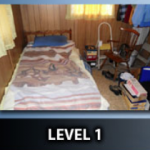
Researchers at the University of California, San Francisco (UCSF) conducted a study that found a whopping 13 percent of older adults experiencing late-life depression report severe compulsive hoarding. Hoarding and depression are similar in that they are what the researchers at UCSF refer to as “frontally mediated.” This essentially means that both disorders impact the frontal lobes of the brain. This area of the brain is responsible for skills and behaviors like organizing and arranging. People with hoarding disorder are also likely to experience other mental health conditions, such as depression, anxiety, personality disorders like obsessive-compulsive disorder (OCD), alcohol dependence, and attention deficit hyperactivity disorder (ADHD).
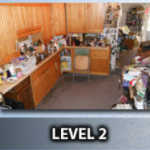
“In particular, late-life hoarding poses a significant fall risk by creating trip-and-fall hazards throughout the home,” explains Catherine Ayers, Ph.D., ABPP, division director of the VA San Diego Healthcare System (VASDHS) La Jolla Mental Health Outpatient Clinics, assistant professor in the University of California San Diego (UCSD) Department of Psychiatry, and faculty member in the SDSU/UCSD Joint Doctoral Program in Clinical Psychology. “Other risks include fire hazards, poor hygiene and nutrition, and poor sanitary conditions.”
Adult Children Of Hoarders: It Is Not Your Fault
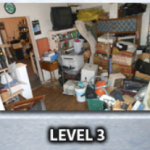
If you know of, or are related to, a senior that has a hoarding problem, please understand it is not your fault if the bad thing happens. You can only do so much, and our system is set up to protect their right to hoard not your right as an adult child to prevent disaster. This is a common problem, and you are not alone. It’s ok to talk about it.
This isn’t your secret to keep.
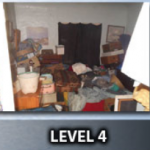
Adult children of hoarders often experience painful childhoods, unable to invite friends to the home. Many are ashamed of their family and may self-medicate their emotional pain by using drugs and alcohol. There is often an underlying current of resentment and anger that ends up interfering with the relationship between child and parent(s). The adult child starts to dread the parents’ deaths as that means they will have to go through all the storage units, house(s), sheds, back yards, and any other places they have hidden items.
Once they leave home, they will often go in the opposite direction, and clean their homes obsessively so that they are “never like my parents“. Some adult children will take the same path as their parents, not knowing any other way to live.
Even as adults, they will continue to keep the family secret until they enter into therapy or a friend or spouse points out that it’s not their secret to keep. The burden of secrets can be a heavy one, especially for a child. Being able to talk about it takes a hundred pounds off the back of the adult child of a hoarder, and they will then find that they are not alone.
Is There Help Available?
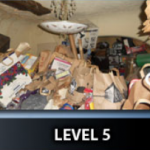
YES. There’s help for the person who is hoarding and there is additional help for the adult (or minor) children of hoarders. Sites like Hoarders.com (Steri Clean Inc.) offer a range of services to families. Their program offers help from clean up to support groups. They even offer an anonymous online support group: “We have two online hoarding support groups for hoarders. You are welcome to join us each week or as often as you like. The two support groups are set up with you in mind. There are no cameras, so nobody can see you, and there is no talking so nobody will hear you. You just log in, type in any name you want and you will enter into the virtual chat room where everyone simply types to each other“.
(Levels of Hoarding photo credit Steri Clean Inc.)
If you or a loved one are struggling with hoarding, or if you are an adult child of a hoarder, please seek out support. You don’t need to go through this alone. And don’t forget…it’s not your secret to keep. Secrets only keep people from getting help, and it’s an unhealthy coping mechanism.
See you next week, Dear Reader, and until then, be gentle with yourself and others. We are all dealing with both seen and unseen issues. Nobody is perfect.
Editors note: This blog is not a replacement for sound medical advice, and many diseases, disorders, and syndromes have symptoms that overlap. Only a qualified medical professional can diagnose you. That said, if you think this blog may be helpful to others, please hit the Facebook Icon and share it on your personal pages. Thank you for reading us, we really do appreciate you!
Excellent article. Another topic to add to the list of helping people to become aware.
TY for sharing
Judy